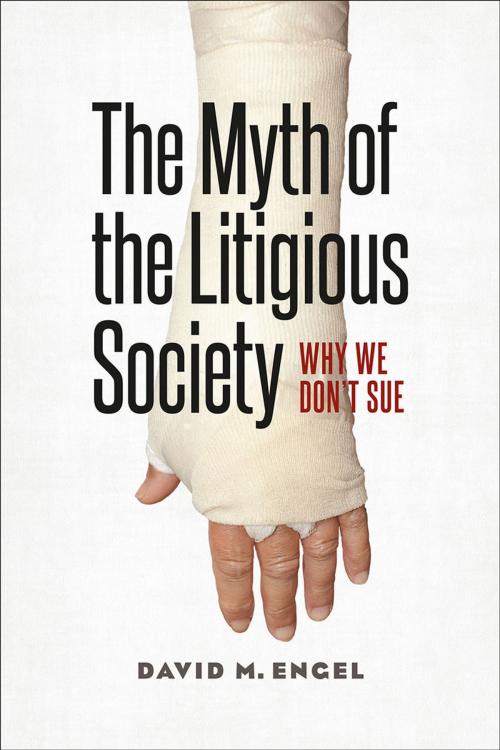The Myth of the Litigious Society
Why We Don't Sue
Nonfiction, Reference & Language, Law, Litigation, Social & Cultural Studies, Political Science, Government, Public Policy| Author: | David M. Engel | ISBN: | 9780226305189 |
| Publisher: | University of Chicago Press | Publication: | September 16, 2016 |
| Imprint: | University of Chicago Press | Language: | English |
| Author: | David M. Engel |
| ISBN: | 9780226305189 |
| Publisher: | University of Chicago Press |
| Publication: | September 16, 2016 |
| Imprint: | University of Chicago Press |
| Language: | English |
Why do Americans seem to sue at the slightest provocation? The answer may surprise you: we don’t! For every “Whiplash Charlie” who sees a car accident as a chance to make millions, for every McDonald’s customer to pursue a claim over a too-hot cup of coffee, many more Americans suffer injuries but make no claims against those responsible or their insurance companies. The question is not why Americans sue but why we don’t sue more often, and the answer can be found in how we think about injury and personal responsibility.
With this book, David M. Engel demolishes the myth that America is a litigious society. The sobering reality is that the vast majority of injury victims—more than nine out of ten—rely on their own resources, family and friends, and government programs to cover their losses. When real people experience serious injuries, they don’t respond as rational actors. Trauma and pain disrupt their thoughts, and potential claims are discouraged by negative stereotypes that pervade American television and popular culture. (Think Saul Goodman in Breaking Bad, who keeps a box of neck braces in his office to help clients exaggerate their injuries.) Cultural norms make preventable injuries appear inevitable—or the victim’s fault. We’re taught to accept setbacks stoically and not blame someone else. But this tendency to “lump it” doesn’t just hurt the victims; it hurts us all. As politicians continue to push reforms that miss the real problem, we risk losing these claims as a way to quickly identify unsafe products and practices. Because injuries disproportionately fall on people with fewer resources, the existing framework creates a social underclass whose needs must be met by government programs all citizens shoulder while shielding those who cause the harm.
It’s time for America to have a more responsible, blame-free discussion about injuries and the law. With The Myth of the Litigious Society, Engel takes readers clearly and powerfully through what we really know about injury victims and concludes with recommendations for how we might improve the situation.
Why do Americans seem to sue at the slightest provocation? The answer may surprise you: we don’t! For every “Whiplash Charlie” who sees a car accident as a chance to make millions, for every McDonald’s customer to pursue a claim over a too-hot cup of coffee, many more Americans suffer injuries but make no claims against those responsible or their insurance companies. The question is not why Americans sue but why we don’t sue more often, and the answer can be found in how we think about injury and personal responsibility.
With this book, David M. Engel demolishes the myth that America is a litigious society. The sobering reality is that the vast majority of injury victims—more than nine out of ten—rely on their own resources, family and friends, and government programs to cover their losses. When real people experience serious injuries, they don’t respond as rational actors. Trauma and pain disrupt their thoughts, and potential claims are discouraged by negative stereotypes that pervade American television and popular culture. (Think Saul Goodman in Breaking Bad, who keeps a box of neck braces in his office to help clients exaggerate their injuries.) Cultural norms make preventable injuries appear inevitable—or the victim’s fault. We’re taught to accept setbacks stoically and not blame someone else. But this tendency to “lump it” doesn’t just hurt the victims; it hurts us all. As politicians continue to push reforms that miss the real problem, we risk losing these claims as a way to quickly identify unsafe products and practices. Because injuries disproportionately fall on people with fewer resources, the existing framework creates a social underclass whose needs must be met by government programs all citizens shoulder while shielding those who cause the harm.
It’s time for America to have a more responsible, blame-free discussion about injuries and the law. With The Myth of the Litigious Society, Engel takes readers clearly and powerfully through what we really know about injury victims and concludes with recommendations for how we might improve the situation.















